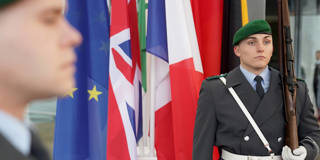For historical reasons, Europe has long resided in the strategic shadow of the United States, which itself has underwritten decades of globalization and rapidly expanding prosperity. But the global balance of power is rapidly shifting, leaving Europe increasingly exposed.
BERLIN – The European Union, and particularly Germany, have yet to rise to the challenge posed by the United States’ retreat from global leadership. But, given the new competition from China, together with Russia’s renewed great-power aspirations, Western countries must find a way to cooperate more closely.
To that end, five issues seem vital. The first is Germany’s relationship with the US, which is now under severe stress. The elephant in the room is Germany’s failure to increase its annual defense spending to 2% of GDP, as agreed at the 2014 NATO summit in Wales. For obvious historical reasons, Germany is hesitant to become Europe’s de facto military power. Were it to meet its spending commitment, it would be allocating €80 billion ($89 billion) per year to the Bundeswehr, which is €46 billion more than what France spends.
Still, to do its part within the alliance without raising fears in Eastern Europe, Germany could spend 1.5% of its GDP on materiel and personnel, while committing an additional 0.5% to fund NATO’s operations in the Baltics and in Poland. That would both bolster the eastern member states’ ability to defend themselves against Russian aggression and demonstrate Germany’s willingness to shoulder more responsibility.

BERLIN – The European Union, and particularly Germany, have yet to rise to the challenge posed by the United States’ retreat from global leadership. But, given the new competition from China, together with Russia’s renewed great-power aspirations, Western countries must find a way to cooperate more closely.
To that end, five issues seem vital. The first is Germany’s relationship with the US, which is now under severe stress. The elephant in the room is Germany’s failure to increase its annual defense spending to 2% of GDP, as agreed at the 2014 NATO summit in Wales. For obvious historical reasons, Germany is hesitant to become Europe’s de facto military power. Were it to meet its spending commitment, it would be allocating €80 billion ($89 billion) per year to the Bundeswehr, which is €46 billion more than what France spends.
Still, to do its part within the alliance without raising fears in Eastern Europe, Germany could spend 1.5% of its GDP on materiel and personnel, while committing an additional 0.5% to fund NATO’s operations in the Baltics and in Poland. That would both bolster the eastern member states’ ability to defend themselves against Russian aggression and demonstrate Germany’s willingness to shoulder more responsibility.